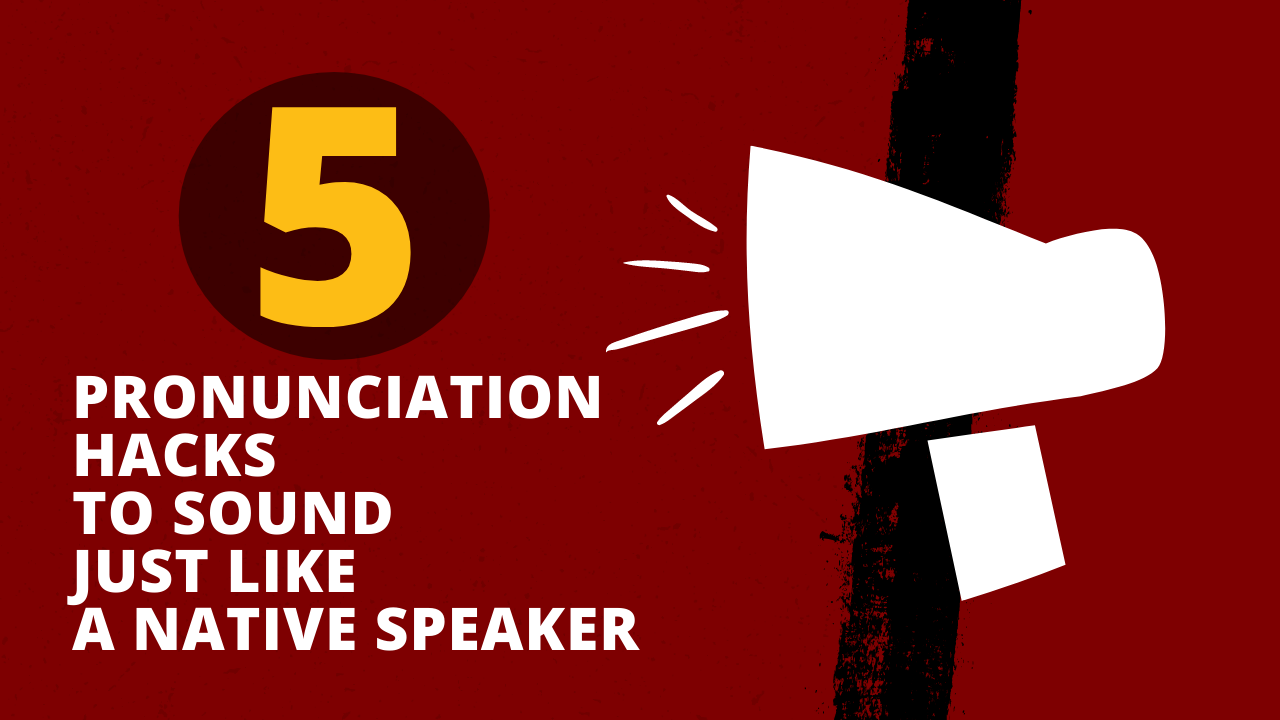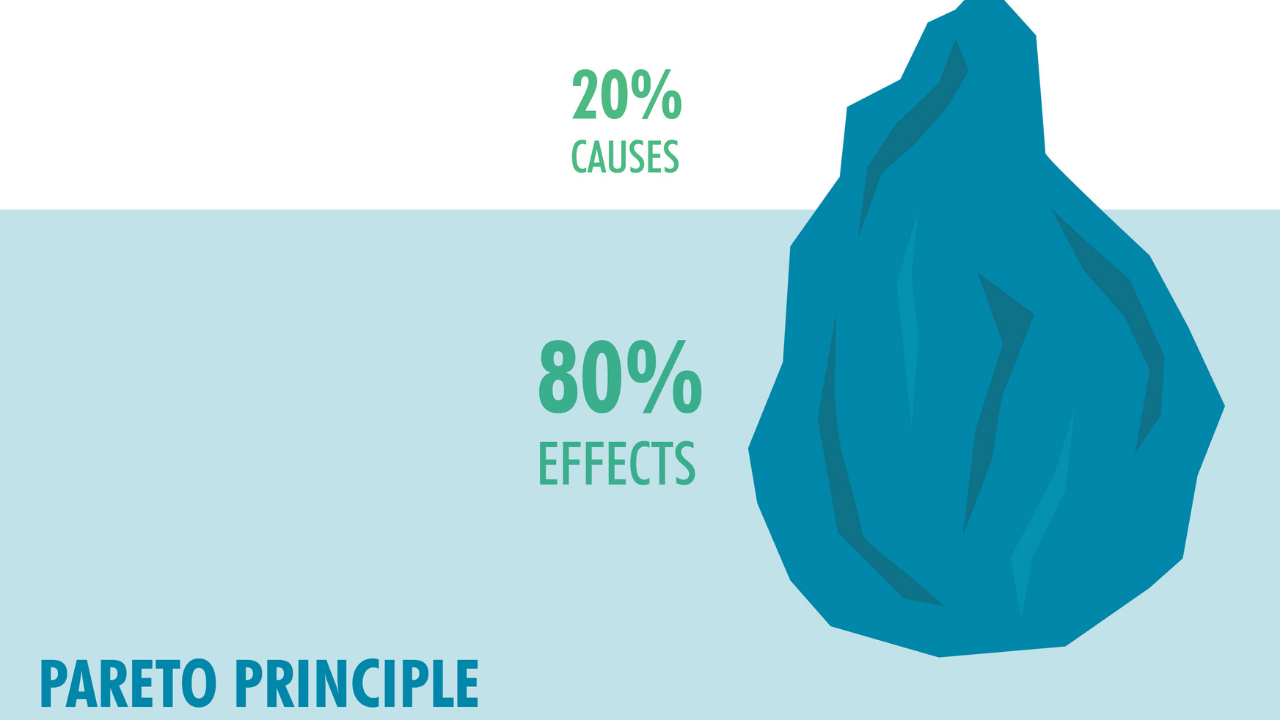5 Pronunciation Hacks to Sound Just Like a Native Speaker - Detailed Explanation
Aug 07, 2021
A few weeks ago a business English learner asked me if they had to focus on only 5 things for them to improve their speaking and pronunciation, what would they be?
I think this is an awesome question for more reasons than one. But it’s a great question mainly because 80% of our results come from 20% of the work. We call this ‘Pareto’s Principle’ or the ‘80/20 Rule’.
It can be applied to many different things, like marketing, building a business, and even learning a language. You see, a lot of the time business English learners focus too much on the stuff that doesn’t matter and not enough on the stuff that does matter.

That’s why in this blog article, I’m going to be giving you the ‘20%’ that will truly transform your speaking skills and help you sound more fluent, natural and confident - just like a native speaker!
I’m also going to be giving you some additional tips on things you can do to practice more so you can implement what we learn today.
We’ll start with the easy stuff and get progressively more difficult as we go. Ready?
What is We Speak Business Program
We Speak Business is an English course with live speaking lessons for English learners who want speaking practice with native speakers, professional teachers, and students from around the world.
You have live speaking lessons where you can join and start speaking business English every day. There's a lesson every day and also, you can review all record lessons. There is a lot of conversation practice for each level of English (A2, B1-B2, C1). There is a calendar of scheduled lessons so you can see when lessons are and at what time you can join and start speaking.
In We Speak Business program, you have 24/7 support and also you have student chat where you can speak with other students from all around the world. Before you join our program and start speaking business English, we strongly recommend you sign up for our free seminar with Andrew Smith, where you can learn:
- What goals you need to have to get better results
- How to master business English quickly
- What are the strategies that will help you advance to a higher level
- How you can speak business English more fluently and confidently
- Free resources to help you learn business English
- Exclusive resource to improve your speech
Pronunciation Hacks
More often than not, English and business English learners will focus on and worry more about accent as opposed to pronunciation. They think that if they have a natrive English speaking accent then it will fix everything and everyone will understand them.
This is like putting a bandaid on a broken leg.
Before you even start thinking about accent, you should first fix your pronunciation. If you can pronounce words correctly and clearly, then the accent will fall into place.
One of our mottos at We-Speak-Business is ‘Clarity Over Accent!’ This is something I am constantly drilling into my student’s heads because pronouncing words clearly will always be more important and effective than just having a native English speaking accent.
The next few paragraphs are going to show you which pronunciation areas you should work on if you really want to sound more confident and fluent like a native speaker. Try practicing them at home in front of a mirror or if you work in an English speaking environment, pay careful attention to these five areas.

Pronunciation Hack #1: Syllable Stress
A syllable is basically the beat that makes up a word. Every time you say a word in English, it will consist of different sounds which can be broken up into syllables. Syllables and syllable stress are probably something you learned a little bit about at school (but probably nowhere near enough!)
Here are some general rules for getting syllable stress right.
Words with just one syllable won’t have any stress. Words like ‘cat’, ‘dog’, ‘car’, and ‘pen’, all have one syllable, therefore these words have no stress.
Words with two or more syllables will always have one stressed syllable. Take a look below at some examples:
comˈpete
- 🌑
ˌvolunˈteer
- • 🌑
ˌinspiˈration
- • 🌑 •
You see those big black dots under the words? That is where the stress is in that word and this is where we should emphasize the pronunciation.
If we put the stress in the wrong place, the word will sound ‘off’ and incorrect, and it could even confuse the listener.

Here’s a short task for you that you can do on the weekend - write a list of 10-20 words in English and locate the stress. A good dictionary should show you this if you aren’t sure.
Practice saying those words in front of a mirror paying particular attention to the stressed syllable. Check your answers online or with a business English teacher to see how many you got right and which ones you need to work on.
Pronunciation Hack #2: Long and Short Vowel Sounds
Our second hack is all about long and short vowel sounds. This is one of the most common errors I hear business English learners make, mostly because the sounds and mouth positionings are very different to those of their mother tongue.
Long vowel sounds sound like you are saying the letter itself. Short vowel sounds occur when the letter is not pronounced the way it sounds. Long vowel sounds are created by placing two vowels together or ending the word with an 'E. ' Short vowel sounds happen when a vowel is placed next to a consonant.
When a vowel and single consonant are followed by an ‘e’ (in the same syllable), the ‘e’ is almost always silent, but it causes the preceding vowel to be long. (Examples: ate, plane, Pete, bite, nine, rope, note, cube, flute.)
There are just a few exceptions, most involving a 've' or an 'one': above, dove (the bird), give, have, live (the verb), love, move, prove, etc. A few others: come, done, gone, none, and one, as well as office.
To practice, I would recommend first of all practicing the long vowel sounds. These are slightly easier and will set you up for the shorter vowel sounds which can be more difficult. Really pay attention to the way your mouth moves and the shape it makes when you make these long vowel sounds. If the mouth positioning is correct, then the pronunciation will also be correct.

Pronunciation Hack #3: Pronouncing ‘’S" at The End of Words
Another common mistake is not pronouncing the ‘S’ at the end of plural countable nouns. That ‘S’ is so important not only for grammatical reasons, but it also makes you sound more clear and fluent. By really focusing on the the ‘S’ at the end of words, your speech will sound a lot more natural and authentic than those who don’t say it.
You can start improving on this by first practicing the letter ‘S’ on it’s own. Just practice saying ‘Sssssss’ in front of a mirror. Once you’ve gotten the hang of it, try saying some these words and really try to draw out that ‘S’ sound:
- carSsss
- dogSsss
- machineSssss
- computerSsss
- wallSsss
- stationSsss
The longer you can make that ‘S’ sound, the better. You may also notice that once you start doing this, you won’t be able to read or speak as quickly as before. This is fine! In fact, this is great! Because you’re putting pronunciation over pace of speaking. Other people don’t care how fast you speak, but they do care about how clearly you speak!
Pronunciation Hack #4: Strong and Weak Forms
Did you know that some common words in English have different forms? We call them ‘strong forms’ and ‘weak forms’.
It is very common to use strong form and weak form when speaking in English because English is a stress-time language. It means you stress on content words such as nouns and principal verbs, while structured words such as helping verbs, conjunctions, prepositions are not stressed. Using proper strong form and weak form can help you to speak English more fluently.
For example, take a look at these sentences:
- She can play the violin.
- Mary is from Chicago.
Here are these two sentences with stressed words in bold.
- She can play the violin.
- Mary is from Chicago.
In this case the words ‘can‘ and ‘is from‘ are weak forms. The weak form changes the vowel to “ə” sound.
- can in strong form: /kæn/
- can in weak form: /kən/
- from in strong form: /frɔm/
- from in weak form: /frəm/
Getting strong and weak forms right is an ongoing process. It can be difficult to understand straight away so watching videos on Youtube or listening to English podcasts are great ways to familiarize yourself with how these sounds should be pronounced. Keep pushing!
Pronunciation Hack #5: Contractions
Our final pronunciation hack today is all about contractions. A contraction is a word made by shortening and combining two words. Words like can't (can + not), don't (do + not), and I've (I + have) are all contractions.
Contractions are typically used in spoken English and in informal writing. But one of the most common mistakes I see a lot of students making is using the long form rather than the contracted form. Native speakers will always use the contracted form in spoken English.
Now, if you’re a beginner or if your level is quite up to par yet, then I recommend getting the full, long forms right first before trying to use the contracted forms. But most business English learners at a B1 level or higher should always be using contractions. Doing so will make you sound more natural and fluent, and you’re mimicking what real native-English speakers do.
Try saying and pronouncing these full forms followed by their contracted form:
Do not > don’t
Can not > can’t
I am > I’m
You are > you’re
We are > we’re
They are > they’re
He is > he’s
She is > she’s
It is > it’s
Should not > shouldn’t
Must not > mustn’t
Would not > wouldn’t
If contractions are difficult for you, then I would suggest starting by just practicing three. Choose the ones you find the easiest and gradually work your way down the list as soon as you’re confident and ready to tackle the rest.

If you want to improve your speaking skills, your pronunciation and sound more like a native speaker, then these 5 tips I have shared with you will really transform the way you speak English and how you sound to other people. But you might be asking yourself: what good is all of this if I have no-one to practice with?
The truth is you need someone to show you how to make the sounds and you definitely need someone to check and correct your pronunciation when you make a mistake. You also need someone who has grown up speaking the language, and someone who is trained in language and pronunciation coaching.
I’d like to invite you to an exclusive free seminar with me, where I show you how to speak better business in one month. In this free two-hour seminar, we have an entire section focused on pronunciation and accent that I think you’ll really find useful and helpful. I also share with you other valuable tips and information on building your business vocabulary fast, how to set goals, how to stay motivated when learning and studying business English, and much, much more!
This seminar is 100% free and if you like what we show you in the seminar, then we also have some very cheap speaking programs you can join where you can get speaking practice with professional native speaking teachers every single day. To join the seminar simply click the link below in the box to reserve your seat and get started.
P.S. There is a limited number of seats available and we have run these seminars fairly regularly, so you’ll definitely find a time that fits you and your schedule.
Thanks for reading and see you in our free seminar.
To your success!
If you are looking to improve your speaking skills at work, then we have an exclusive free seminar where I teach you how to speak better business in 30 days. Sign up by clicking the button below!



